Our Jordan Bateman helped HoweStreet.com host Jim Goddard work through Jim’s concerns for BC’s small businesses and restaurant sector — and previewed the upcoming federal and BC budgets.
Month: April 2021
TRAINING THURSDAY: Employment Standards Act Refresher
Kerry Vital and Jordan Bateman talk about ICBA Training’s April 20th Employment Standards Act Refresher — 90 minutes that could save your company tens of thousands of dollars. Lawyer Jessica Thomson will review ESA requirements that especially affect construction employers, including contracts, who is a “manager,” overtime, and more. Plus Kerry and Jordan announced ICBA Instagram contest winners; discussed three new Training instructors; and lamented the return of COVID-19 restrictions.
#BCPOLI HOTSTOVE: Pandemic Despair and Taxing Thin Air
Our Jordan Bateman and TheOrca.ca’s Maclean Kay discuss the troubling pandemic numbers in BC, the Canucks’ outbreak, and the NDP Government’s plan to tax the air above small businesses. Plus NPA shenanigans and a quick shoutout to the #DewCrew.
ICBA CONSTRUCTIVE CONVERSATIONS: Chris Gardner
Chris Gardner may have graduated with a law degree from The University of British Columbia, but it is clear from the way he discusses the construction industry that construction is his first love. Today Chris uses his law background to help spur policy changes that will open up the construction industry in Canada and ensure that all workers within the field are properly represented and cared for.
 For the past four years, Chris as served the President of the Independent Contractors and Businesses Association (ICBA) and actively takes on policy development work, ensures employees have access to health and retirement plans and encourages new graduates to actively consider a career within the construction industry. He believes that Canada offers “tremendous opportunities for young people pursuing a career in the trades” and that “the opportunities in construction are significant.”
For the past four years, Chris as served the President of the Independent Contractors and Businesses Association (ICBA) and actively takes on policy development work, ensures employees have access to health and retirement plans and encourages new graduates to actively consider a career within the construction industry. He believes that Canada offers “tremendous opportunities for young people pursuing a career in the trades” and that “the opportunities in construction are significant.”
Chris is also careful to point out that while the construction industry was hurt by the pandemic, as were all areas of industry, it was able to continue onwards and was labeled an essential service. This allowed men and women within the field to continue to work and support their families. This essential service designation makes it an even more stable industry to consider as a new graduate leading Chris to note it’s “exciting” and “doesn’t get the attention that I think the sector deserves.”
One of the primary goals of Chris’ role at ICBA is to ensure that women and men receive proper benefits and support throughout their careers in the British Columbia region. He added that they are a large sponsor of Trades Apprentice and “there’s nothing more important right now than finding workers.” In addition to external pressures such as COVID-19, the sector is working hard to attract new younger workers and he feels that strong benefits and stability is the best way to do so.
The pandemic actually proved how stable the construction industry is noticing that while 15% of overall activity was down, most projects continued onwards. One of the reasons for this is “construction consultants are good at mobilizing people and equipment and maintaining a schedule to get a project to completion.”
One of the largest issues facing the construction industry is the red tape that surrounds construction permits, and that is one area where Chris and ICBA are trying to create stronger policy. Canada is a G7 economy but it ranked number 64 for the length of time to get a construction permit and that is disappointing and an “embarrassing statistic.” However, it is something that can be fixed and corrected, and it’s a chief concern for the ICBA.
However, what ICBA is focused on now is balancing a new workforce that is diverse and dynamic. Women and immigrants are key demographics and the industry is working hard to show that the industry is a place with room for “stellar growth,” stability, benefits, and something for every single person.
TRAINING THURSDAY: Painter and Decorator Red Seal Exam Prep
ICBA MEMBER ALERT: WorkSafeBC Enforcing New COVID-19 Rules, With Closure Penalties
 Yesterday afternoon, BC Provincial Health Officer Dr. Bonnie Henry announced new rules for workplaces that serve as a reminder to all of us to continue to be strict about our COVID-19 prevention protocols.
Yesterday afternoon, BC Provincial Health Officer Dr. Bonnie Henry announced new rules for workplaces that serve as a reminder to all of us to continue to be strict about our COVID-19 prevention protocols.
Dr. Henry’s team and WorkSafeBC are still putting together the detailed regulations, but here is what we know:
- Under the new rules, WorkSafeBC prevention officers now have the power to close any business or worksite with a known COVID-19 outbreak.
- Outbreaks will likely be defined as three or more co-workers presumed to have contracted COVID-19 at work.
- Closures will last at least 10 days, but could be more.
- In larger workplaces, like construction sites, the closure may only affect a specific team or area, but that is at the discretion of WorkSafeBC.
- Workplaces with outbreaks will be asked by WorkSafeBC prevention officers for their COVID-19 safety plans (here is WorkSafeBC’s guide to those plans).
- Once reopened, WorkSafeBC will inspect the site to ensure COVID-19 protocols are being followed.
Construction has fared very well thus far in the pandemic and stands out as example for how other industries can operate safely in our new COVID-19 world. Of the nearly 110,000 British Columbians who have contracted COVID-19, only 31 cases have been traced by WorkSafeBC to transmission on a construction site.
This is a testament to the hard work and leadership in safety shown by all the men and women working in construction. With the threat of new COVID-19 variants and the potential for site closures, it’s important that we all continue the commitment to working safely that has been demonstrated so strongly by the construction industry over the past 12 months.
For WorkSafeBC’s specific guidance to construction sites, click HERE.
ICBA IN THE NEWS: Construction sector bracing for ‘grey tsunami’
Excerpts from an article that ran in the April 8, 2021 edition of Business In Vancouver:
Both U.S. president Joe Biden and Canadian Prime Minister Justin Trudeau have said their respective countries need to “build back better,” as hope for a post-pandemic economic rebound appears on the horizon.
But who is going to do all that better building?
Because Canadians are retiring at a rate that exceeds workforce entry rates, a skilled-labour shortage that has been predicted for about a decade has already arrived for B.C.’s construction sector.
“I would say it has gone from a flashing yellow light to a solid red light, in terms of the challenges it is presenting to the construction sector in particular,” said Chris Gardner, president of the Independent Contractors and Business Association (ICBA).
A recent ICBA survey found contractors reporting they have had to turn down jobs, are taking longer to complete projects, paying more overtime and spending more time on training.
BuildForce Canada estimates that 41,000 workers will retire from B.C.’s construction sector this decade. Only 35,100 new entrants are expected to fill those jobs.
“Combining retirement and expansion demands, the construction industry will need to recruit close to 59,650 workers over the coming decade,” BuildForce says in a recent B.C. industry snapshot.
Major projects like LNG Canada, the Site C dam and the Trans Mountain and Coastal GasLink pipeline projects appear to have secured the workers they need. A lot of planning and training went into ensuring a reliable skilled workforce for those megaprojects.
But with so many workers tied up with those big energy projects, smaller projects in B.C. may find it harder to attract and recruit workers. In addition to B.C.’s four big energy projects, a number of public works projects are breaking ground or starting in earnest this year, including the St. Paul’s Hospital redevelopment and the Broadway SkyTrain expansion.
The ICBA survey found all contractors in B.C. reporting shortages of glaziers, insulators and steel fabricators.
“There is a skilled trade shortage right across the board,” said Scott Jacob, president of Jacob Bros. Construction, which builds roads, airports, hotels and highrises and employs 250 to 300 workers. “Big, small, medium – it doesn’t matter. Every company has a skilled labour shortage. Through the aging demographic, we are losing more experienced tradespeople than we’re educating every single year. We’ve all been talking about this for a long time, and what we haven’t done a good enough job of is making it appealing. We haven’t told the really good story about why there are great jobs in the construction industry, and we’re paying the price for that now.”
The good news for any young person thinking about working in construction is that the labour shortage has been pushing wages up. The average wage for a construction worker in B.C. is $30 per hour, and, according to the ICBA, some tradespeople can earn as much as $50 per hour.
But because there aren’t enough young Canadians to replace all the Canadians who are now retiring, Jacob thinks Canada will need to revisit its laws governing imported workers.
“I think nationally we have to look at our immigration policy,” Jacob said. “I think it’s time we maybe de-emphasized the need for people to come in with degrees and cash, and instead get some blue-collar tradespeople.”
IN THE NEWS: ICBA Energy Featured by EnergyNow.ca
The following first appeared on EnergyNow.ca on April 12, 2021:
 The Independent Contractors and Businesses Association (ICBA) has been the leading voice of British Columbia’s construction industry for over 45 years, representing more than 3,300 members and clients who collectively employ over 100,000 people. ICBA members are non-union or non-affiliated union contractors and, taken together, these two segments of BC’s construction sector employment account for nearly 85 percent of the approximately 250,000 men and women who work in construction in British Columbia.
The Independent Contractors and Businesses Association (ICBA) has been the leading voice of British Columbia’s construction industry for over 45 years, representing more than 3,300 members and clients who collectively employ over 100,000 people. ICBA members are non-union or non-affiliated union contractors and, taken together, these two segments of BC’s construction sector employment account for nearly 85 percent of the approximately 250,000 men and women who work in construction in British Columbia.
In 2017, ICBA merged with Energy Services BC, an association based in Fort St. John, BC, which represented oil and gas service companies. Today ICBA represents more than 100 members in northeast British Columbia operating in the oil and gas and energy sector.
Fighting to #Get2Yes on responsible resource development has been a key part of ICBA’s advocacy work for several years. ICBA proudly stands up for resource development communities, and over the past several years, has undertaken a number of initiatives aimed at supporting the energy sector, including:
1. Advocated strongly in support of the TransMountain pipeline expansion (“TMEP”), Site C, and LNG Canada / Coastal GasLink Pipeline.
- ICBA intervened to support TMEP in the reference case launched by the Government of BC in the BC Court of Appeal in the Government’s effort to shut down TMEP.
- ICBA was also proud to partner with the Alberta Enterprise Institute in front of the Alberta Court of Appeal supporting the Government of Alberta’s position opposing the new regulatory regime ushered in by Bill C-69.
2. Facilitated a “State of Energy” Town Hall with Alberta Premier Jason Kenney in June of 2020.
3. Stood up for the Energy sector in Ottawa, Alberta, and BC, by making submissions and appearances before committees supporting the energy sector on issues related to:
- BC Environmental Assessment Act Review
- National Energy Board review
- Duties/Tariffs on Large Modular Components
- Bill C-48 and Bill C-69, including participation in CAPP and CEPA working groups
- Federal Clean Fuel Standard
ICBA also produced a “Big Gas Tax” video that gained over 1 million views on social media and won best advocacy video in 2019 in North America, supporting TMEP. The link is here: icba.ca/biggas
When Energy East was cancelled and when one of Canada’s largest financial institutions considered suspending lending to companies in Canada’s energy sector, ICBA spoke up:
- https://vancouversun.com/opinion/op-ed/opinion-end-of-energy-east-pipeline-proposal-another-win-for-our-competitors
- https://financialpost.com/opinion/desjardins-is-making-a-big-mistake-caving-into-anti-oil-activists
Recently, ICBA launched a new mark, ICBA Energy, to support the hundreds of our members and the thousands of their employees who are working day-in and day-out in the oil and gas industry. Under this new brand, ICBA is continuing its federal and provincial government advocacy, speaking up for Canadian energy producers, pushing to cut red tape, and standing up for the hundreds of thousands of Canadians who depend on jobs in the energy sector to support their families and their communities.
#BCPOLI HOTSTOVE: Don’t Turn the Page Yet
Our Jordan Bateman and TheOrca.ca’s Maclean Kay discuss the BC NDP’s Throne Speech, which desperately wanted (but couldn’t) to turn the page on COVID-19.

